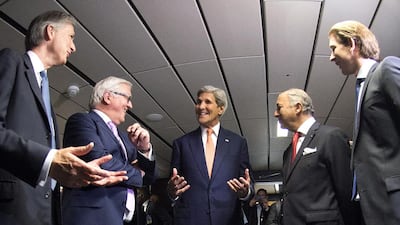Israel and its allies in the United States Congress berate the Iran nuclear agreement that went into effect last week as a dangerous capitulation. The Obama administration and its supporters brag that the deal has tamed a rogue regime and eliminated an even greater peril. But historians studying the issue many years from now will recognise that the Islamic Republic’s nuclear programme was a remarkable strategic success: Iran has effectively banked the strategic benefits of a bomb it never built.
By demonstrably acquiring the means to build a nuclear deterrent – while refraining from actually doing so, and remaining party to the nuclear Non-Proliferation Treaty (NPT) – Tehran won a place at the negotiating table with the world’s major powers, where it was treated with the respect its leadership has long craved and where its regime became party to an important international treaty. The nuclear diplomacy has effectively taken any fantasies among Iran’s foes of regime-change by invasion off the table – an achievement that had been a primary goal in Iran’s nuclear decision-making according to the US National Intelligence Estimate.
While American and Israeli hawks claimed that Iran sought nuclear weapons to destroy Israel and trigger an apocalyptic war, the intelligence community in both countries saw Iran’s strategic motivation as in line with those of all other states that have sought nuclear weapons. Since the US first used atom bombs against the cities of Hiroshima and Nagasaki to force Japan’s surrender in 1945, other states have typically developed their own nuclear deterrents in response to the capabilities of their enemies, in order to guarantee their survival, security and strategic independence.
For Moscow, a nuclear deterrent was essential to prevent Soviet cities being obliterated without consequence in the event of a conflict with the US. For US-allied Britain and France and for Soviet-aligned China, the goal was simply strategic independence.
In the late 1960s, the international community tried to halt this escalating nuclear proliferation via the NPT – a global treaty that sought to prevent further proliferation by guaranteeing civilian nuclear technology to signatories under intrusive inspections and strict controls to prevent weaponisation, while obliging the (then) five established nuclear-weapons states to negotiate their way to complete disarmament.
But four other states – India, Pakistan, Israel and South Africa – were already well on their way to acquiring the bomb, and declined to join the NPT. (South Africa eventually signed the treaty and destroyed its nuclear weapons once the transition from white minority rule was under way; North Korea later withdrew from the NPT in order to build and test nuclear weapons.) Each of those states saw acquiring a nuclear deterrent as key to their own survival, and so the cycle continued.
Iran’s research into nuclear weapons began in the late 1980s, in response to the nuclear efforts of Saddam Hussein’s Iraq, which fought an eight-year war with the Islamic Republic. When the 2003 US invasion of Iraq eliminated Tehran’s most dangerous enemy, Iran’s research into building nuclear weapons was halted.
But Iran continued to steadily acquire key technologies necessary to build a bomb, particularly the ability to enrich uranium. Here, Iran was exploiting the ambiguity of the NPT, which permits member states to build the full fuel-cycle of a nuclear energy programme that effectively gives them “breakout capacity” or “nuclear threshold” status. And it was by moving steadily towards that threshold while staying within the parameters of the NPT that Iran forced the western powers to engage with its regime on an equal footing. This ended the diplomatic isolation that began with the 1979 revolution and saw Tehran regarded as a rogue regime, subject to sanctions and branded a state sponsor of terrorism. The possibility of an Iranian nuclear deterrent prompted the West to opt to reintegrate Iran into the international system.
For all the self-righteous posturing about nuclear threats, that international system continues to be based on the elite of nations that possess nuclear weapons calling the shots. India, Pakistan, Israel and North Korea have been able to defy or ignore the international consensus, in no small part because they hold a golden ticket to the top table where the rules are set.
Has Iran gamed the NPT to use its nuclear development to break out of international isolation? Of course it has. But so have the major powers that called it to account. The US, Russia, China, France and Britain have never paid more than lip service to the NPT’s article VI, which obliges them to negotiate their way to “general and complete disarmament under strict and effective international control”.
President Barack Obama has committed the US to a trillion-dollar upgrade of its nuclear arsenal and the Russians are developing new delivery systems for their warheads. Iran simply played by the unwritten rule of post-Second World War geopolitics in which nuclear weapons have been the price of admission to the top table. Iran’s real innovation was getting to the table with a forged ticket, because its nuclear deterrent was never built.
Tony Karon teaches in the graduate programme at the New School in New York

